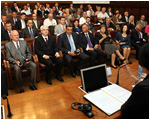
President of the Slovak Republic Ivan Gašparovič and his wife Silvia paid an official visit to Croatia on 11-12 July 2012. The first meeting on his agenda was the one with Croatian President Ivo Josipović in Zagreb. At the meeting the Slovak President emphasised that Slovakia and Croatia did not only have good relations as NATO members but they would also soon become partners within EU structures, with the excellent quality of their bilateral relations being also enhanced by the close proximity of the two nations. “We often hold highest-level meetings, which is a positive signal for businesses that the two countries are also engaged in intensive economic cooperation,” the Slovak President said. He noted that Slovakia was prepared to share with Croatia its experience of the membership in the European Union, as well as of the protection of the Schengen external borders. According to Croatian President Ivo Josipović, Croatia’s bilateral relations with Slovakia are on very good and friendly terms. “This was also proved by the fact that your country was the first one to have ratified the accession treaty between Croatia and the European Union,” President Josipović noted. The current visit also proves the excellent quality in the mutual Croatian-Slovak relations. “I really appreciate the contribution made by the Slovak diplomacy to the peace and stability in the Western Balkan region,” Croatian President said, praising Slovakia’s foreign policy.
Slovak President Ivan Gašparovič described recent developments in economic and trade relations as positive, noting that “our bilateral trade exchange has more than tripled since 2000. In 2011, it even exceeded the pre-crisis levels.” According to the Slovak head of state, “it would be very good if we could also intensify our cooperation in the field of science and research.” The two presidents also discussed the future of relations between Zagreb and Belgrade in the wake of the recent presidential election in Serbia. In addition, the two top officials appreciated the reciprocal treatment provided by their respective countries to the national minority of the other country living in their territory.
“The key question is how Croatia, once it becomes an EU member, will manage to ensure further economic development to its citizens,” President Ivo Josipović said in the beginning of his speech at the Economic Forum in Zagreb. He thanked for the considerable support provided by Slovakia and the Slovak President to Croatia’s European integration efforts, and for the friendship from which the mutual Croatian-Slovak economic cooperation could further benefit in the future.
Speaking before representatives of Slovak and Croatian business communities, Slovak President Ivan Gašparovič said that its membership of the European Union was a great asset to Slovakia. “The results of consolidation efforts pursued by the European Union and the euro area will be extremely important,” he said with respect to the recent problems faced by Europe. President Ivan Gašparovič recommended that Croatia learn a lesson from the mistakes made by the others and, when joining the Union, also draw on our experience from the EU accession process.
On the second day of his official visit, Ivan Gašparovič held talks with Croatian Prime Minister Zoran Milanović in Zagreb, who thanked Slovakia for the prompt ratification of the Croatia-EU accession treaty which Slovakia had approved as the first one of the EU Member States. “Our joint membership of the Alliance and EU structures gives a new dimension to our bilateral relations, as well as new quality for their current and future development,” the Slovak President said at the meeting. Croatian Prime Minister Zoran Milanović informed the Slovak President of his contacts with Slovak Prime Minister Robert Fico and of his planned visit to Bratislava. According to Milanović, the Rijeka sea port is the major project implemented by his cabinet, whose deepwater terminals make it ideal for cooperation with respect to cargo transit from Slovakia.
President Ivan Gašparovič rounded off his official visit to Croatia at the peninsula of Istria where he met with the head of the Istria County, Ivan Jakovčić, and the mayor of the City of Pula, Boris Miletić, with whom he primarily discussed possibilities for cooperation at the level of local and regional governments, with a special focus on the utilisation of business potential in tourism industry and distribution of goods through the Port of Rijeka.